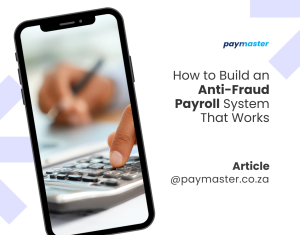Job descriptions can’t just say “Other duties as assigned”—especially not when it comes to the CCMA.
In fact, that job description you’ve been reusing since 2013? Well, it might actually be putting your business at risk.
Remember, job descriptions aren’t just papers to file away; they are legal documents, blueprints, and lifelines when things go pear-shaped.
So, let’s take a closer look at what you really need to include—because the CCMA won’t care if you “thought it was obvious.”

1. The Job Title (No, “Office Ninja” Doesn’t Count)
Start with a clear, real-world title. Yes, creativity is fun. But if you’re calling a receptionist a “Frontline Chaos Coordinator,” you’ll confuse everyone—including your own payroll system.
Stick with something you can justify in a job grading or legal setting. “Social Media Sorceress” won’t fly in a disciplinary hearing.

2. Reporting Lines – Who’s the Boss?
Make sure to specify who this role reports to. After all, “floating in the org chart” isn’t a valid structure—unless, of course, you’re NASA.
This clarity protects both you and the employee when accountability questions come up. Plus, it avoids those awkward moments when no one knows who’s responsible for payroll errors.

3. Job Descriptions Must Spell Out Duties & Responsibilities
Don’t just write “handle admin.” Be specific about what admin tasks you mean. Filing? Minute-taking? Or crisis management via WhatsApp at 10 PM?
Every duty should be clear, measurable, and closely aligned with the position’s purpose. If it’s not written down, don’t expect a tribunal to enforce it later.
And yes, you can include “other reasonable duties”—but be careful not to use it as a catch-all for everything from IT support to plant-watering.

4. Minimum Requirements – Not Your Wishlist
Be sure to specify the exact qualifications, experience, and skills required. And no, that doesn’t mean vague phrases like “must be a team player with good vibes.” Instead, list concrete requirements such as:
– Matric or relevant diploma
– 2 years in a similar role
– Proficiency in X software
Doing this helps ensure fair recruitment, sets clear expectations, and strengthens your position if any disputes arise.

5. Job Descriptions Should Be Honest About Working Hours & Location
If, for example, you expect employees to be available after hours—or even work from a caravan in Atlantis—then it’s essential to say so right from the start. Whether the role is remote, hybrid, or full-time on-site, you must clearly spell it out. Otherwise, misunderstandings are almost guaranteed.
Furthermore, it’s equally important to outline any expectations around overtime, weekend shifts, or seasonal changes to the schedule. In fact, the more upfront you are, the less likely you’ll need to deal with disputes later.
After all, while surprises may be great for birthday parties, they have no place in employment contracts. Therefore, by taking the time to be detailed and transparent now, you’ll not only set your team up for success but also protect your business from future confusion or legal trouble.

6. Performance Expectations – Measurable, Not Magical
Include KPIs or success indicators if possible. It makes performance reviews (and eventual discipline) so much easier.
Instead of saying “must be efficient,” say: 🔹 “Respond to all client queries within 24 hours” 🔹 “Capture 100% of sales reports weekly”
Vague descriptions lead to vague performance—and vague arguments.

7. Job Descriptions Must Include Compliance Clauses to Cover Your Legal Bases
Include a note that the role must be performed in line with the Labour Relations Act, BCEA, EE Act, and POPIA.
That way, if things go sideways, you’ve already set the expectation that this role operates within legal and ethical boundaries.
Bonus: it makes you look very official. (And you are.)
Final Thoughts:
A proper job description is very important. First of all, it protects you as the employer. But it also protects your employee and your entire business. In fact, when there is a disagreement or problem about performance, a clear job description is your first line of defence. Even better, it becomes your best friend if you ever have to deal with the CCMA.
Now, if you are unsure where to begin, or if your current job descriptions sound more like poems than clear instructions, don’t worry. TeamMaster HR is here to help you. We can guide you step-by-step to make sure your job descriptions are clear, fair, and legal.
So, let’s work together to write your job descriptions properly. Write them once, write them right. This way, you will never have to lose sleep again wondering “what their job actually was” or “who was responsible for what.”
Remember, a good job description makes work easier for everyone—employers and employees alike.





